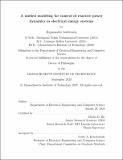A unified modeling for control of reactive power dynamics in electrical energy systems
Author(s)
Jaddivada, Rupamathi.
Download1227519503-MIT.pdf (5.833Mb)
Other Contributors
Massachusetts Institute of Technology. Department of Electrical Engineering and Computer Science.
Advisor
Marija D. Ilic.
Terms of use
Metadata
Show full item recordAbstract
This thesis is motivated by the renewed need to understand and control the dynamics of reactive power in the electrical energy systems. Of particular interest are the dynamical non-sinusoidal interactions between heterogeneous system components, such as power-electronically controlled renewable intermittent resources, storage, delivery components, and loads. The main contribution of this thesis is a newly-introduced model which relates the mismatch in the rate of power absorbed/produced by the diverse components to their reactive power dynamics; all else evolves around this novel modeling. The notion of reactive power dynamics is further generalized for diverse types of energy conversion processes. As an outgrowth of the previous work, we propose a physically intuitive multi-layered interactive model for characterizing the input-output dynamics of components and the dynamics of their interactions in the interconnected system, especially when reactive power dynamics become dominant. The higher layer model utilizes the new model and is in terms of instantaneous power and the rate of change of generalized reactive power. The dynamics of instantaneous power is a direct consequence of energy conservation law. In contrast, the dynamics of generalized reactive power reflects the difference between the rates of work potential and the useful work. The ratio of the generalized reactive power and the work potential, thus represents the inefficiencies in power transfer between the components. Notably, the higher layer models are linear, creating opportunities for scalable analysis and provable control design, under mild assumptions on stand-alone component models. We then re-interpret the critical role of nonlinear decentralized power electronically-switched controllers in enabling the feasibility, stability, and robustness of the emerging electric energy systems using this new modeling. We consider several examples to demonstrate the generality and the intuitive analysis and control design principles, brought about by the proposed modeling.
Description
Thesis: Ph. D., Massachusetts Institute of Technology, Department of Electrical Engineering and Computer Science, September, 2020 Cataloged from student-submitted PDF of thesis. Includes bibliographical references (pages 189-207).
Date issued
2020Department
Massachusetts Institute of Technology. Department of Electrical Engineering and Computer SciencePublisher
Massachusetts Institute of Technology
Keywords
Electrical Engineering and Computer Science.